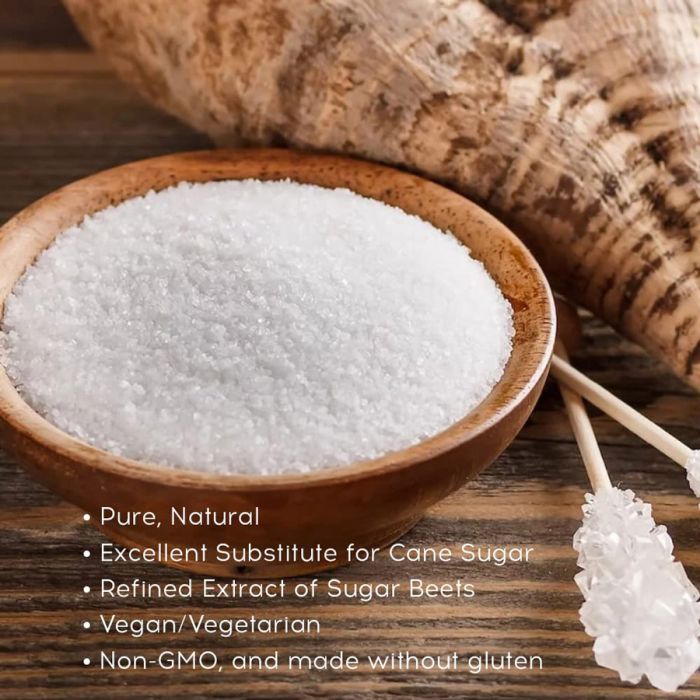When looking at beet sugar vs cane sugar, some argue that one browns better than the other.
Checking Out the Distinctions in operation and Advantages Between Beet Sugar Vs Cane Sugar
In the cooking world, the choice in between beet sugar and cane sugar is not simply about sweetness however involves a nuanced consideration of flavor, application, and impact. While both sugars stem from different plants, each undertakes one-of-a-kind production procedures that subtly influence their qualities and suitability for numerous recipes.
Origins and Production Processes of Beet and Cane Sugar

Walking cane sugar, on the various other hand, comes from the sugarcane plant, a tropical turf indigenous to Southeast Asia yet currently cultivated in exotic zones worldwide - beet sugar vs cane sugar. The manufacturing of cane sugar begins with the harvesting of cane stalks, which are squashed to launch the juice.

Nutritional Material and Wellness Considerations

When contrasting the dietary material of beet sugar and cane sugar, it comes to be obvious that both types basically provide the same calorie worths, with about 16 calories per teaspoon and no considerable nutrient diversity. Each is composed practically totally of sucrose, which is a basic carbohydrate that provides fast energy however lacks vitamins, minerals, or fiber. This similarity encompasses their effect on wellness, especially worrying blood sugar levels. Both sugars, when eaten in excess, can add to raised blood sugar degrees, a threat aspect for diabetes mellitus and other metabolic disorders. Too much intake can lead to weight gain and oral troubles, as both sugars are similarly cariogenic, promoting tooth decay. From a health viewpoint, moderating consumption of any type of sugar, whether from beet or cane, is suggested to prevent these prospective negative impacts on well-being. Thus, neither holds a distinctive benefit over the other in terms of health benefits.
Flavor Accounts and Culinary Applications
In spite of their similar chemical frameworks, beet sugar and cane sugar differ subtly in flavor, which can affect their usage in numerous culinary contexts. Walking cane sugar often lugs a tip of molasses, even in its polished form, providing a cozy, caramel-like undertone that improves baked items, coffee, and chocolate-based recipes. This mild molasses taste is especially valued in the cooking sector for adding depth to sugary foods and pastries. On the various other hand, beet sugar is identified by its extremely refined, neutral preference, making it a versatile sweetener that does not modify the why not try this out taste profiles of meals. This nonpartisanship is specifically helpful in fragile dishes, such as light breads, creams, and some sauces, where the inherent tastes of various other active ingredients are planned to attract attention. Chefs and food makers could select one type of sugar over the other based on the wanted taste result of their culinary productions.
Ecological Impact and Sustainability
While both beet and cane sugars are acquired from plants, their ecological effects differ dramatically due to the unique approaches of farming and processing required for each. Sugar beet cultivation typically includes considerable automation, which can raise fossil gas intake and carbon exhausts.
Moreover, the handling of sugarcane often produces a significant quantity of waste, consisting of bagasse, which, although useful as biofuel, regularly contributes to air pollution if melted inefficiently. Sugar beet handling uses even more of the raw materials, leading to less waste. Both sectors encounter obstacles in lowering their ecological impacts, however continuous developments in agricultural techniques and waste monitoring are aiming to enhance sustainability.
Economic Elements Affecting the Sugar Market
The financial characteristics read the full info here of the sugar sector are dramatically influenced by global market demands and trade plans. In areas where sugarcane or sugar beet manufacturing is subsidized, manufacturers might have a financial advantage that enables them to use reduced rates on the international market.
Additionally, fluctuations in worldwide demand for sugar, influenced by nutritional fads and commercial usage in food items, straight influence rates and manufacturing degrees. beet sugar vs More about the author cane sugar. Weather additionally play a pivotal function, as they can dramatically influence plant returns and, subsequently, the supply chain. This irregularity presents a level of economic uncertainty that can lead to investment volatility in sugar production markets, affecting decisions from planting to market strategy
Conclusion
In final thought, both beet and cane sugar have unique top qualities that suit various culinary needs. While cane sugar conveys a rich taste suitable for enhancing baked products, beet sugar's neutrality is best for lighter dishes.